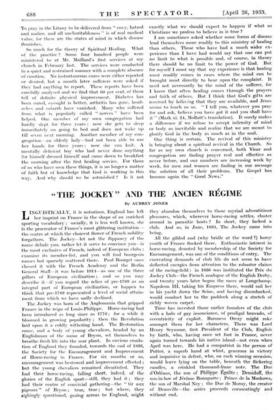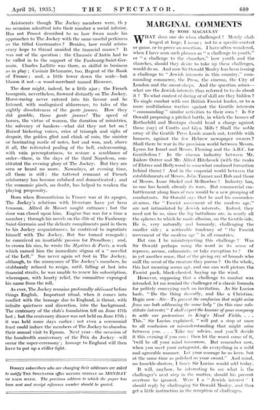" THE JOCKEY " AND THE ANCIEN REGIME
By AUBREY JONES
LINGUISTICALLY, it is notorious, England has left her imprint on France in the shape of an enriched Sporting vocabulary ; socially, it is lesS well known, she is the procreator of France's most glittering institution— the centre at which the choicest flower of French nobility forgathers. The Jockey—let not the flippancy of the name delude you, rather let- it serve to convince you—is the most exclusive ofFrench, indeed of European clubs : examine its member-list, and you will find bourgeois names but sparsely scattered there. Paul Bourget once classed it with the French Academy and the Berlin General Staff--it was before 1914—as one of- the three pillars of European civilization ; and so you may describe it—if you regard the relics of • pre-1789 as an integral part of European civilization, or happen to think that pre-1789 represented a- level of social attain- ment from which we have sadly declined.
The Jockey was born of the Anglomania that gripped France in the reign of Louis-Philippe. Horse-racing had been introduced as long since as 1776 ; for a while it bloomed - in growing popularity ; • then - the -Revolution laid upon -it a coldly withering hand. The Restoration came, and a body of young chevaliers, headed by an Englishman• of the name of Bryon, set themselves to breathe fresh life into the sear plant. In envious emula- tion of England they founded, towards the end of 1833, the Society for the Encouragement and Improvement of Horse-racing in France. For six months or so, encouragement was bestowed and improvement effected ; but the young chevaliers remained dissatisfied. They had their horse-racing, falling short, indeed, of the glories of the English sport—still, they had it ; they had their centre of convivial gatheringthe " tir aux pigeons " of Bryon ; true, true ; but where, they sighingly questioned, • gazing across to England, might they abandon themselves to those myriad adventitious pleasures, which, wherever horse-racing settles, cluster around in parasitic hosts ? In short, they lacked a club. And so, in June, 1834, The Jockey came into being.
All the gilded and (why bridle at the word ?) horsy youth of France flocked there. Enthusiastic interest in horse-racing, denoted by membership of the Society for Encouragement, was one of the conditions of entry. The enervating demands of club life do not seem to have deflected energies from attention to the robuster claims of the racing-field : in 1836 was instituted the Prix du: Jockey Club—the French analogue of the English Derby; and twenty years later began the races. at Longcharnp: Napoleon III, taking his Empress there, would sail her in his yacht down the Seine, and -having disembarked, would conduct her to the paddock along a stretch of richly woven carpet. '
Time has invested those earlier founders of the club with a halo of gay insouciance, of prodigal bravado, of eccentricity of exploit. Baroness Orczy might rake amongst them for her characters. There was Lord Henry Seymour, first President of the Club,• English by birth, who, having once set foot in France, never again turned towards his native island—not even when April was here. He had a compatriot in the person of Potter, a superb hand at whist, generous in victory and impfthsive in defeat, who, on each winning occasion, would leave lying on the table, beneath the flickering candles, a crinkled thousand-franc note. The Due d'Orleans, the son of Philippe Egalite Demidoff, the son-in-law of Jerome Bonaparte ; Prince de Ia Moskowa, the son of Marshal Ney ; the Due de Morny, the creator of Deauville—the series proceeds coruscatingly. and without end.- . Aristocrats though The Jockey members were, th y on occasion admitted into their number a social inferior. Has not Proust described to us how Swan made his approaches to The Jockey with the same easeful perkiness as the, titled Guermantes ? Besides, how could aristo- cracy hope to thread unaided the financial mazes ? - It was out of the question : the Chaussee d'Antin had to be called in to the support of the Faubourg-Saint-Ger- main. Charles Laffitte was there, as skilful in business as in play ; Casimir Delamarre, too, Regent of the Bank of France ; and, a little lower down the scale—but blazon it not,--a wood-merchant named Rieussec.
• The door might, indeed, be a little ajar ; the French -bourgeois; nevertheless, frowned distantly on The Jockey. Horse-racing never entered into his favour and he listened, with undisguised abhorrence, to tales of the nightly dissoluteness of the gants jaunes. How they did gamble, those gants jaunes! The speed of horses, the virtue of women, the duration of ministries, the solvency of bankers—what did they not bet on ? Raised' bickering voices, cries of triumph and sighs of despair, the golden glint and chink of coin, the sinister or fascinating rustle of notes, lost and won, and, above it all, the reiterated pealing of the bell, endeavouring, with vain peremptoriness, to restore a semblance of order—these, in the days of the third Napoleon, con- stituted the evening glory of The Jockey. But they are seen or heard no more. Nowadays, at evening time, all there is still : the tattered remnant of -French aristocracy has become subdued and domesticated ; and the economic pinch, no doubt, has helped to weaken the playing propensity.
Born when Romanticism in France was at its apogee, The Jockey's relations with literature have yet been tenuous. Alfred de Musset sought entrance ; but the door was closed upon him. Eugene Sue was -for a time a member ; through his novels on the elite of the Faubourg- Saint-Germain and the delicate compliments paid in them to his Jockey acquaintances, he contrived to ingratiate himself with The Jockey. But Sue turned renegade ; he conceived an insatiable passion for Proudhon ; and, to crown his sins, he wrote the Mysteres de Paris, a work which earned him the immediate stigma of a " novelist of the Left." Sue never again set foot in The Jockey, although, to the annoyance of The Jockey's members, he stubbornly refused to resign, until, falling at last into financial straits, he was unable to renew his subscription, whereupon, with hearty relief, the committee expunged his name from the roll.
AS ever, The Jockey remains profoundly obeissant before things English. Important ritual, when it comes into conflict with the homage due to England, is thrust, with infinite quietness and discretion, into the background. The centenary of the- club's foundation fell on June 17th last ; but-the centenary dinner was not held on June 17th ; it was held some days earlier : not even a ceremonial feast could induce the members of The Jockey to abandon their annual visit to Epsom. Next year—the occasion of the hundredth anniversary of the Prix du Jockey—will occur the super-ceremony ; homage to England will then have to put up a stiffer fight.











































 Previous page
Previous page